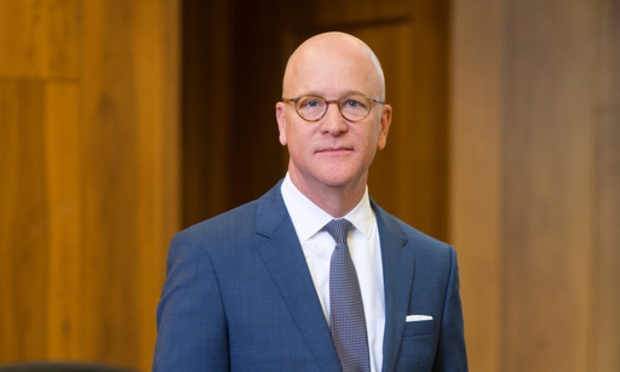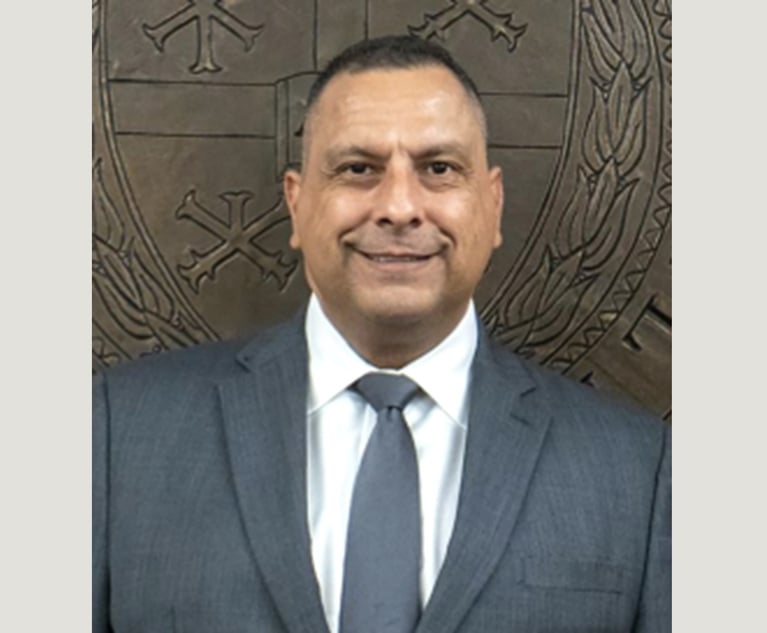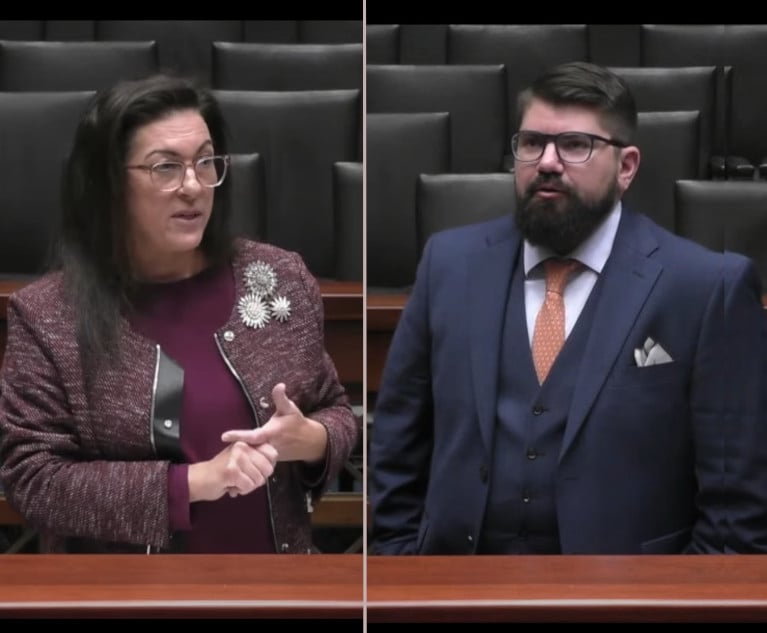Bench Slap for Lawyers Criticizing Opposing Counsel in Baylor University Sex Assault Case
“If either party files briefing in the future that is not directly responsive to the motion pending, or otherwise relevant to the requested relief, the court will take appropriate measures,” warned the order by U.S. District Judge Robert Pitman.
April 16, 2019 at 03:06 PM
4 minute read
 U.S. District Judge Robert Pitman. Photo: Joel Salcido
U.S. District Judge Robert Pitman. Photo: Joel Salcido
A federal judge has rebuked the attorney representing 15 Jane Doe plaintiffs suing Baylor University over its alleged mishandling of their sexual assault claims.
U.S. District Judge Robert Pitman chastised “plaintiffs' counsel” for alleging, in the midst of a discovery dispute, that opposing counsel from Thompson & Horton were asking abusive questions in depositions. The plaintiffs' counsel who raised the issue in a motion response are Jim Dunnam of Dunnam & Dunnam in Waco and Chad Dunn of Brazil & Dunn in Houston.
“The court will not permit the parties to use court filings to deliver material to the news media that is irrelevant to the immediate issue before the court,” Pitman wrote in the April 16 order in Doe v. Baylor University, pending in the U.S. District Court for the Western District of Texas.
The plaintiffs raised the claims of “abusive” questioning in an April 9 motion responding to Baylor's motion to compel production of Facebook messages, texts and other communications by the plaintiffs. The response argued the abusive deposition questions “attempt to brand a scarlet letter on someone unfortunate enough to be raped” by asking things about their clothes, how deeply they were penetrated during their assaults and miniscule details, such as the lighting in the room where they were raped.
Related story: Thompson & Horton Lawyers Accused of Asking 'Abusive' Questions to Plaintiffs in Baylor University Sex Assault Suit
The outside counsel for Baylor handling the depositions include Thompson & Horton partners Holly McIntush of Austin and Lisa Brown of Houston and associate Ryan Newman of Houston. McIntush and Brown each didn't return a call seeking comment, and Newman declined to comment.
In a court filing responding to the deposition allegation, Baylor wrote that it conducted depositions with respect and didn't want the experience to be unpleasant for the plaintiffs, but added that Baylor has a right and responsibility to learn about the circumstances of the plaintiffs' allegations. The filing added that the plaintiffs had not fully produced the items Baylor requested in discovery.
On the underlying issue about the discovery materials, the judge found the plaintiffs must provide much of the information. On the deposition allegation, Pitman noted he previously warned the parties not to speculate on opposing counsel's motivations and instead to keep briefs factual and limited to requested relief.
The order said discovery in a sexual assault case is highly sensitive, and it's critical to conduct depositions with decency. If not, the court would consider requests for relief. Yet here, the plaintiffs didn't ask for specific relief about the depositions, noted the order.
“If either party files briefing in the future that is not directly responsive to the motion pending, or otherwise relevant to the requested relief, the court will take appropriate measures,” the order warned.
Dunnam said he did not send his filing to the news media to write an article.
“You called me,” he said. “The press follows the ECF filings in this case unlike anything I've ever seen.”
He declined to say whether the plaintiffs would request specific relief from the court over the depositions issue.
“We don't want to try this case in the newspaper,” Dunnam said. “We want it to go to a jury,”
Dunn didn't immediately return a call seeking comment.
Read the order here.
This content has been archived. It is available through our partners, LexisNexis® and Bloomberg Law.
To view this content, please continue to their sites.
Not a Lexis Subscriber?
Subscribe Now
Not a Bloomberg Law Subscriber?
Subscribe Now
NOT FOR REPRINT
© 2025 ALM Global, LLC, All Rights Reserved. Request academic re-use from www.copyright.com. All other uses, submit a request to [email protected]. For more information visit Asset & Logo Licensing.
You Might Like
View All

How Uncertainty in College Athletics Compensation Could Drive Lawsuits in 2025

'It's Like They Lynched You:' Law Professor's Discrimination Claim Reaches High Court
7 minute read
Uvalde Shooting 'Fresh in Everyone's Mind:' Lone Dissenting Judge Disagrees with School's Disciplinary Decision Over Pellet Gun
Trending Stories
- 1Many LA County Law Firms Remain Open, Mobilize to Support Affected Employees Amid Historic Firestorm
- 2Stevens & Lee Names New Delaware Shareholder
- 3U.S. Supreme Court Denies Trump Effort to Halt Sentencing
- 4From CLO to President: Kevin Boon Takes the Helm at Mysten Labs
- 5How Law Schools Fared on California's July 2024 Bar Exam
Who Got The Work
Michael G. Bongiorno, Andrew Scott Dulberg and Elizabeth E. Driscoll from Wilmer Cutler Pickering Hale and Dorr have stepped in to represent Symbotic Inc., an A.I.-enabled technology platform that focuses on increasing supply chain efficiency, and other defendants in a pending shareholder derivative lawsuit. The case, filed Oct. 2 in Massachusetts District Court by the Brown Law Firm on behalf of Stephen Austen, accuses certain officers and directors of misleading investors in regard to Symbotic's potential for margin growth by failing to disclose that the company was not equipped to timely deploy its systems or manage expenses through project delays. The case, assigned to U.S. District Judge Nathaniel M. Gorton, is 1:24-cv-12522, Austen v. Cohen et al.
Who Got The Work
Edmund Polubinski and Marie Killmond of Davis Polk & Wardwell have entered appearances for data platform software development company MongoDB and other defendants in a pending shareholder derivative lawsuit. The action, filed Oct. 7 in New York Southern District Court by the Brown Law Firm, accuses the company's directors and/or officers of falsely expressing confidence in the company’s restructuring of its sales incentive plan and downplaying the severity of decreases in its upfront commitments. The case is 1:24-cv-07594, Roy v. Ittycheria et al.
Who Got The Work
Amy O. Bruchs and Kurt F. Ellison of Michael Best & Friedrich have entered appearances for Epic Systems Corp. in a pending employment discrimination lawsuit. The suit was filed Sept. 7 in Wisconsin Western District Court by Levine Eisberner LLC and Siri & Glimstad on behalf of a project manager who claims that he was wrongfully terminated after applying for a religious exemption to the defendant's COVID-19 vaccine mandate. The case, assigned to U.S. Magistrate Judge Anita Marie Boor, is 3:24-cv-00630, Secker, Nathan v. Epic Systems Corporation.
Who Got The Work
David X. Sullivan, Thomas J. Finn and Gregory A. Hall from McCarter & English have entered appearances for Sunrun Installation Services in a pending civil rights lawsuit. The complaint was filed Sept. 4 in Connecticut District Court by attorney Robert M. Berke on behalf of former employee George Edward Steins, who was arrested and charged with employing an unregistered home improvement salesperson. The complaint alleges that had Sunrun informed the Connecticut Department of Consumer Protection that the plaintiff's employment had ended in 2017 and that he no longer held Sunrun's home improvement contractor license, he would not have been hit with charges, which were dismissed in May 2024. The case, assigned to U.S. District Judge Jeffrey A. Meyer, is 3:24-cv-01423, Steins v. Sunrun, Inc. et al.
Who Got The Work
Greenberg Traurig shareholder Joshua L. Raskin has entered an appearance for boohoo.com UK Ltd. in a pending patent infringement lawsuit. The suit, filed Sept. 3 in Texas Eastern District Court by Rozier Hardt McDonough on behalf of Alto Dynamics, asserts five patents related to an online shopping platform. The case, assigned to U.S. District Judge Rodney Gilstrap, is 2:24-cv-00719, Alto Dynamics, LLC v. boohoo.com UK Limited.
Featured Firms
Law Offices of Gary Martin Hays & Associates, P.C.
(470) 294-1674
Law Offices of Mark E. Salomone
(857) 444-6468
Smith & Hassler
(713) 739-1250






